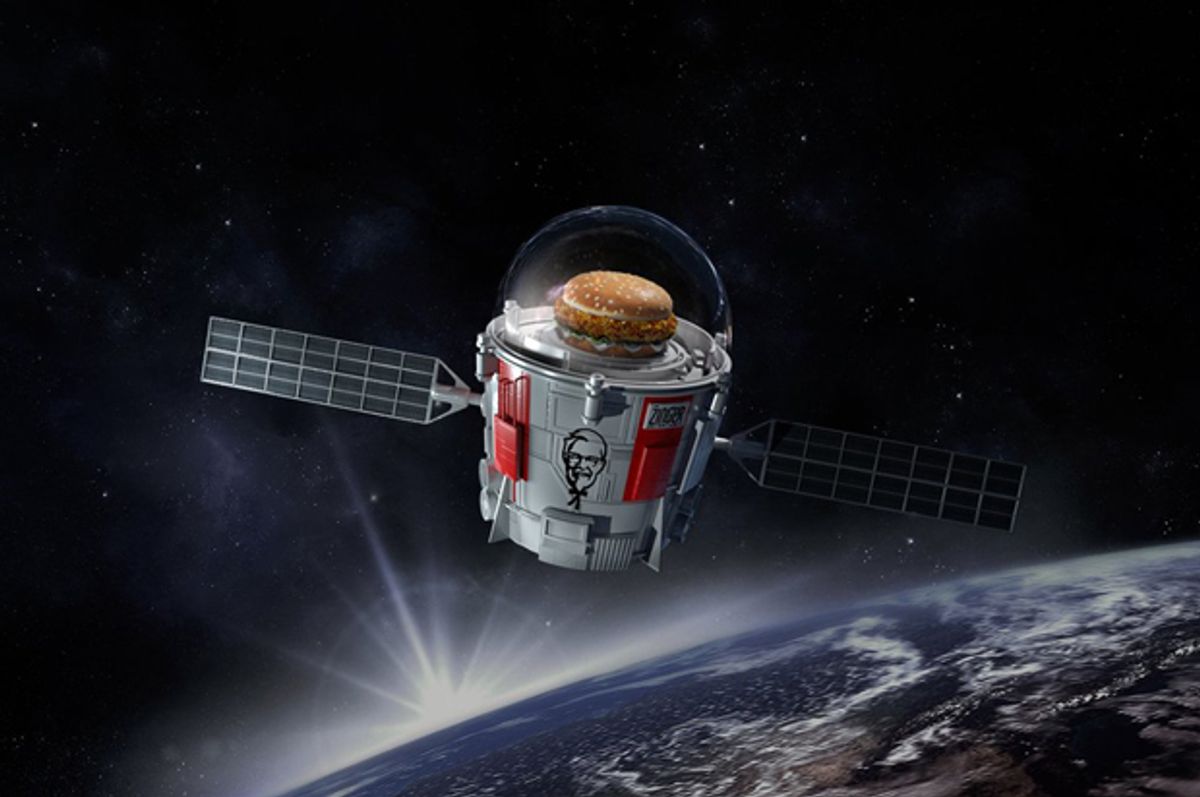Space: the final frontier of capitalism. Obama’s pro-space privatization policies ushered in a new commercial space race, epitomized by the bloom in government-contracted private spaceflight companies like SpaceX and Orbital ATK. Unlike NASA, private enterprise's sole goal in space is to profit, and hence space is increasingly becoming just another realm for capitalists to market their ambitions.
And yet, the announcement this week that a chicken sandwich would be going to the edge of space still came as a bit of a surprise to those of us who follow space news. The New York Times reported that a private high-altitude balloon company, World View Enterprises, had partnered with Kentucky Fried Chicken to send one of the fast-food company’s chicken sandwiches to space — or rather, just the edge of space, as the company’s balloons don't quite hit the 62-mile altitude that marks the border with space.
It's not that KFC's chicken sandwich stunt is offensive — space is not a sacred place, even if sci-fi franchises like Star Trek treat it that way. It is more that KFC’s stunt comes at the dead end of years of political and policy shifts toward the way that we conceive of space. In particular, it epitomizes the way that profit-minded capitalists, rather than exploration-minded scientists, are the ones pulling the strings when it comes to space travel. Big Science (or Big Defense) doesn’t rule space anymore; Big Business does.
The chicken stunt comes at a political moment in which private interest in space is at a historic high. There are multiple reasons for this beyond the aforementioned government privatization; our historically high income inequality means that there are plenty of rich people with ungodly sums to burn, and private space tourism interests many of them. That is why World View Enterprises exists; the chief executive told the Times reporter that the company intended to provide a “market for tourism rides that might not go as high as Blue Origin’s or Virgin Galactic’s but that would last much longer while offering a similar view of Earth.” Research meteorologists are interested in World View Enterprises’ balloons for forecasting, though of course, their needs are ancillary — like all private enterprise, World View's fundamental goal is profit, not knowledge.
Yet space seems to have become a place of interest for capitalism not really because there’s money there — there’s not, beyond government science and tourism, and the latter is still largely speculative capital. Rather, corporations like Yum! Brands, parent company of KFC, seem far more interested more in the idea of space, and how they might use it for their marketing.
Thinking about space often inspires awe and reverence for humanity and our place in the universe. “In outer space you develop an instant global consciousness,” said Apollo astronaut Ed Mitchell, who flew to the moon on the Apollo 14 mission. “From out there on the Moon, international politics look so petty. You want to grab a politician by the scruff of the neck and drag him a quarter of a million miles out and say, 'Look at that, you son of a bitch.’” Space exploration asks us to consider our place, and how small we are in comparison to the universe.
Advertisers love appropriating this rhetoric and discourse and having us associate it with their own brands. That's why there are so many candy bars and cars named after astronomical objects. I’ve wondered if the absurd investor hype toward unprofitable companies like SpaceX — whose revenue is almost entirely from the federal government — have their stock artificially inflated by their cultural associations with these big ideas. Certainly, Silicon Valley is no stranger to this aspirational branding strategy, albeit rather than play on the rhetoric of space exploration, the tech industry plays on visions of technological utopia, and the notion that these for-profit companies exist to “change the world,” rather than what they’re actually doing, which is profiting off it. Private space enterprises market themselves as having a similarly "higher" purpose.
It’s telling how space entrepreneurs always tie space privatization to some idea of “freedom.” As World View Enterprises’ chief executive told the Times, “If you fly a chicken sandwich to space, why can’t you fly anything? […] You’re really showing how you can make space accessible to almost anyone at almost anytime for almost anything.”
Yet a private trip to space is “accessible” in the same way a home in Malibu is “accessible” — that is to say, it’s off limits to most of the world. Only a large corporation would waste money on frivolities like sending a chicken sandwich to the stratosphere. I’m reminded of Gil Scott-Heron’s 1970 poem, “Whitey on the Moon":
I can't pay no doctor bills
But whitey's on the moon
Ten years from now I'll be payin' still
While whitey's on the moon
The man just upped my rent last night
Cause whitey's on the moon
One wonders how Gil Scott-Heron might react to the current state of affairs: whitey got bored of the moon, and is now sending perfectly good food to the stratosphere to rot.

Shares